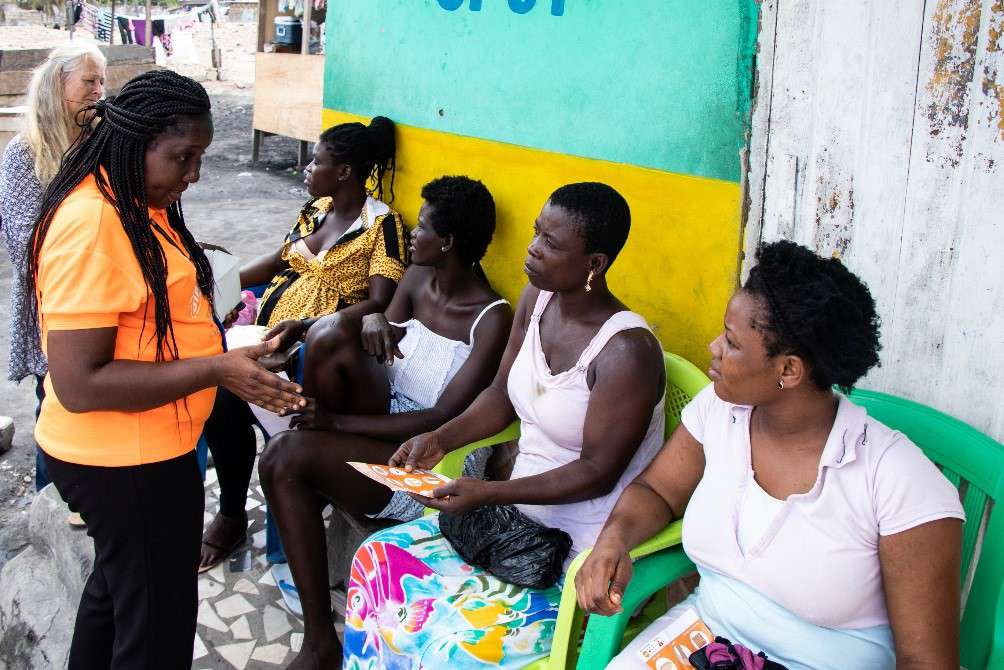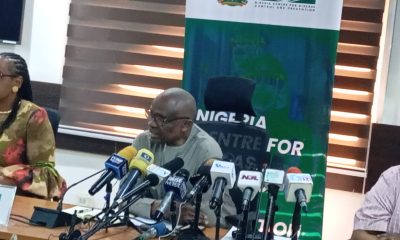NEWS
Contraception Day: Lawmaker advocates women empowerment to make right choices

Mrs Marilyn Okowa-Daramola, Member representing Ika North East constituency in the Delta State House of Assembly, has advocated women empowerment to make informed decisions about their reproductive health.
Okowa-Daramolaade made the call in her acceptance speech after she was being conferred with the award of “Delta Family Planning Ambassador” by the Family Planning team of the State Ministry of Health and its associates on Monday in Asaba.
She pledged her resolve to support the team to ensure the state government improved its budgetary provision and advocacy for family planning to ensure the success of the programme in the state.
Okowa-Daramola, who served with the immediate past administration had during her service delivery mandate, championed the course of women and girl child empowerment in the state.
According to her, family planning is a fundamental human right not an option.
She pledged to work with the partners and associates to breakdown all barriers against women and girl child as regards family planning matter in the state.
She noted that family planning was a pathway to gender equality, economic stability, improved healthcare outcomes and cornerstone of a brighter and more prosperous future for Delta.
The lawmaker said that the target goal was to break down the cultural barriers and stigma associated with family
planning.
According to her, it will also ensure that every woman and girl in the state has the knowledge and resources to make informed choices about their reproductive health.
“I stand before you today with immense gratitude and a deep sense of responsibility as I accept the role of Family Planning Ambassador for Delta State.
“I want to thank the ministry of health and family planning partners and advocates, who have placed their trust in me to champion this vital cause.
“It is an honour to be given this opportunity to further contribute to the well-being of women and girls in our dear state.
“Family planning is not just a matter of reproductive health, it is a fundamental
human right.
” It is the key to empowering women and girls to make informed choices about their bodies, their futures, and their families,” she said.
She noted the World Contraception Day, being celebrated every Sept. 26, would serve as global reminder of the critical importance of access to family planning services.
“It is a day to celebrate choice, education, and the fundamental right of every individual to make informed decisions about their reproductive health.
“” We will work tirelessly to promote awareness, advocate for access by engaging with policymakers, healthcare providers, and community leaders to ensure that family planning services are readily available and affordable to all, regardless of their socioeconomic status.
“We shall challenge stigmas, harmful stereotypes surrounding family planning and create safe spaces for open dialogue and provide accurate information to dispel myths.
“We shall empower women and girls with the knowledge and tools they need to make informed decisions about their
reproductive health; engage men and boys as family planning must be a collective effort,” Okowa-Daramola said.
On his part, Dr Christian Tetsola, Director, Public Health, Delta Ministry of Health, while conferring the award on Okowa-Daramola, said her role in women and girl child empowerment informed the investiture as the FP ambassador.
“We are here as part of the event to mark the veneration of the World Contraception Day for 2023.
” And today, we confer on Okowa-Daramola, the title of Family Planning Ambassador and by extension, Reproductive Health Ambassador.
“She has been an advocate for the girl child and reproductive issue also mainly to do with women, though men are included,” he said.
Tetsola said that the ministry had outlined its programmes to mark the year’s World Contraception Day with a road walk to advocate for family planning in the state capital, Asaba.
The News Agency of Nigeria (NAN) reports that in attendance were team of experts in the reproductive and family planning units of the state ministry of health, representatives of World Health Organisation; Marie Stopes; Centre for Communication and Social Impact (CCSI), Abuja, FCT.
NEWS
Lassa Fever: Nigeria Records 190 Deaths – DG NCDC

By Laide Akinboade, Abuja
The Federal Government, FG, has revealed on Monday, that there were 190 deaths since January as a result of Lassa Fever.The Director General, Nigeria Centre for Disease Control and Prevention, NCDC, Dr. Jide Idris, stated this while briefing journalists in Abuja, on the updates, preparedness and response of Lassa Fever outbreak in Nigeria.
He noted that Nigeria in 2024 have recorded 9,492 suspected cases, 1,154 confirmed with 190 deaths. He said only 10 Local Government Areas in Nigeria accounted for over 59% of the confirmed cases. While, six states make up 89% of the confirmed cases.He said in 2024 there is an increase of over 13% on fatality. And he lamented that there has been an alarming increase in Lassa fever cases and deaths in the last 4 weeks, signaling the outbreak’s severity. On yultide, the NCDC boss advised that during this festive period, Nigerians should be very careful what they eat at this period.”The Nigeria Centre for Disease Control and Prevention (NCDC) continues to address the current Lassa Fever outbreak during this peak season. Lassa fever remains endemic in Nigeria, posing a significant public health risk across all states. The disease occurs throughout the year, with peak transmission typically recorded between October and May. Outbreaks typically occur during the dry season, when human exposure to rodents is highest. “Cumulatively this year, we have recorded 9,492 suspected cases, 1,154 confirmed with 190 deaths. Six states make up 89% of the confirmed cases, namely: Ondo (29.7%), Edo (22.7%), Bauchi (17.9%), Taraba (8.8%), Benue (5.6%), and Ebonyi (4%). 10 LGAs (Owo, Etsako West, Esan West, Kirfi, Ardo-Kola, Toro, Ose, Akure South, Jalingo and Idah) accounted for almost 59% of the confirmed cases. “There has been an alarming increase in Lassa fever cases and deaths in the last 4 weeks, signaling the outbreak’s severity. First, the case fatality rate has consistently remained high, over 13%. “We have noted a rise in the number of suspected cases compared to a similar timeline in 2023. This, however, could be attributed to the increased / enhanced surveillance.”Most cases continue to emerge from endemic areas, like Bauchi, Ondo, Edo, Taraba Ebonyi and Enugu, underscoring the need for targeted interventions in these states”. He stressed that the major objective of NCDC is to reduce the number of cases and importantly, deaths and protect th vulnerables in the society. He said, “These trends therefore demand a coordinated effort to strengthen our response and protect our vulnerable populations.”In addressing this situation, it is important to highlight the proactive measures taken by the Nigeria Centre for Disease Control and Prevention (NCDC) so far. These efforts demonstrate our commitment to preparedness, coordination, and response at all levels.”We conducted a dynamic risk assessment to determine the appropriate emergency activation level. The risk has been categorized as High and Response Level 2 advised, and efforts to be tailored specifically to the states currently experiencing increased case burden”.”The EOC was activated to ensure seamless coordination of Lassa fever control and management activities using a One Health approach”.He said, in preparation for this outbreak season, critical medical supplies, infection prevention and control (IPC) materials, and laboratory diagnostic tools and materials have been distributed to various states, nationwide.”Lassa Fever testing laboratories have also been expanded from about 9 to 13, and more will still be upgraded “Shared mitigation activities outlined in the Lassa fever preparedness plan, including advisories with all 36 states and the FCT, focusing on the hotspot states (Edo, Ebonyi, Bauchi, Ondo and Benue)”, he said. Lassa fever is an acute viral haemorrhagic fever (VHF) caused by the Lassa virus. The natural reservoir for the virus is the multimammate rat (also known as the African rat). Other rodents can also act as carriers of the virus. The virus spreads through: Direct contact with droppings from the urine, faeces, saliva, or blood of infected rats.Contact with objects, household items, and surfaces contaminated with infected rats’ urine, faeces, saliva, or blood.Consuming food or water contaminated with these droppings Person-to-Person transmission can also occur through direct contact with the blood, urine, faeces, vomit, and other body fluids of an infected person.Lassa fever initially presents like other common illnesses accompanied by a fever, such as malaria. Other symptoms include headache, general body weakness, cough, nausea, vomiting, diarrhoea, muscle pains, chest pain, sore throat, and, in severe cases, bleeding from ears, eyes, nose, mouth, and other body openings. Early presentation to ensure diagnosis and treatment of the diseases can greatly increase the chances of patient survival. Early symptoms should be reported and admitted quickly for early treatment. People of all age groups who come in contact with the urine, faeces, saliva, or blood of infected rats.People living in rat-infested environments.People who consume potentially contaminated foodstuff, especially those left open overnight or dried outside in the open.People who handle or process rodents for consumption. People who do not perform hand hygiene at appropriate times. Caretakers of infected persons with poor infection prevention and control measures.Healthcare workers including:Doctors, nurses, and other health workers who provide direct patient care in the absence of standard precautions.Hospital staff who clean and disinfect contaminated surfaces, materials, and supplies without adequate protective gear.Laboratory staff who handle blood samples of suspected Lassa fever patients without appropriate precautions.Persons who prepare and/or handle bodies of deceased Lassa fever cases without appropriate precautions.The NCDC therefore adviced Nigerians in order to reduce the risk of Lassa fever infection:Always keep your environment clean, especially our homes, markets, dump sites to reduce breeding grounds for ratsBlock all holes in your house to prevent the entry of rats and other rodents.Cover your dustbins and dispose of refuse or waste properly. Communities should set up dump sites far from their homes to reduce the chances of the entry of rodents into their homes.Safely store food items such as rice, garri, beans, corn/maize, etc., in tightly sealed or well-covered containers. And avoid open drying of food stuff Properly process or prepare rats (bushmeat) before consumptionAvoid drying food stuff outside on the ground or roadside, where it is at risk of contamination.Discourage bush burning and Deforestation as these can destroy the homes and food sources of rodents, driving them to migrate from the bushes to human residences to find food.Eliminate rats in homes and communities by setting rat traps and other appropriate and safe means.Practice good personal and hand hygiene by frequently washing hands with soap under running water or using hand sanitizers when necessary.Avoid overcrowded living areas as overcrowding leads to poor sanitationAvoid self-medication to ensure proper diagnosis and early treatment.Visit the nearest health facility if you notice any of the signs and symptoms associated with Lassa fever mentioned earlier or call the State Ministry of Health hotline and 6232 (NCDC). This is essential because early identification and treatment of cases are more effective and can save lives.NEWS
Police Apprehend Suspect over Alleged Human Trafficking in C’ River

The Police Command in Cross River has apprehended one Victor Eyop, 35, for alleged trafficking of girls from Nigeria to Libya.
CP Gyogon Grimah, Cross River Commissioner of Police, confirmed this on Monday at a news conference in Calabar.
Grimah explained that on Nov. 9, one Mr Chidi Samuel, in Calabar, reported a case of human trafficking against the suspect.
He said that on that date, Samuel claimed that the suspect and his wife, Mrs Esther Eyop, allegedly recruited Ms Deborah Nyong, 25.
“They also recruited two others, Ms Anita Lawrence, 25, and Ms Mabel Tom, 16, for human trafficking to Libya after they were tested for the Human Immune Virus (HIV) and other Sexually Transmitted Diseases (STIs).
“After the test, the suspect took them to his house and the next day gave them a substance they were to mix in their bath water for cleansing before embarking on the journey.
“On Nov. 12, the suspect and his wife drove the girls to Bogobiri Street in Calabar, where they booked tickets and transported them to Kaduna with arrangements with one Hajiya (names unknown) to receive the girls in Kaduna,” he said.
The commissioner noted that while in Kaduna, a taxi driver was sent to pick up the girls and further transported them to Katsina. However, along the road to Katsina, the vehicle developed a fault.
Grimah said it was at this point that the victims realised that they were being trafficked, started contacting people for help and the complainant, Samuel, sent money to them through a Point of Sale (POS) operator along the road.
He said, with that money, they boarded a taxi back to Kaduna and found their way back to Calabar on Nov. 15.
Grimah said that court prosecution would begin the moment the investigation was concluded.
On his part, the suspect claimed that he did not know that what he did was an offense noting that he was only assisting people to travel out.
“I am not a travel agent, but my sister is in Libya, it is through her that the girls are being taken to Libya.
“The girls were aware of the plan from inception that they would be taken to Katsina and from where ‘Hajiya’ would direct them on how to get to Libya,” he narrated. (NAN)
NEWS
Adhering to Fiscal Discipline will Check Inflation- Economists

An economist, Prof. Bright Eregha, has urged the federal and state governments to adhere to fiscal discipline and support import substitution to combat rising inflation.
Eregha, who lectures at the Economics Department, Pan Atlantic University, expressed this in an interview with newsmen in Lagos on Monday.
He said that over the past year, the allocation of the Federal Accounts Allocation Committee (FAAC) to various subnational governments had surged significantly due to economic reforms implemented by the government.
Eregha said that this increase in allocations had raised the money supply within the economy.
According to him, this can also lead to a rise in the current inflation rate if these funds are not channeled into productive sectors.
He stressed the necessity for the governments to invest in mechanised agriculture as a solution to the prevailing food insecurity.
“An increased budgetary allocation to mechanise our agriculture is essential to boost food production, irrespective of whether it is harvest season or not,” he stated.
Eregha argued that such investments would aid the country in achieving self-sufficiency in food production and help mitigate the food-induced inflation currently being experienced.
Also, Prof. Tunde Adeoye, Senior Lecturer, Economics Department, University of Lagos, advocated import substitution to curb the inflation rate.
He stated, “The government should adopt macroeconomic policies that will encourage indigenous companies to commence the production of some imported items locally and be patronised by our people.
“This will strengthen our local capacity and reduce our volume of imports over time, which is exerting too much pressure on our foreign exchange,” he explained.
According to Adeoye, the surge in inflation rate is more of a structural challenge within the general economy.
He said, “The situation has gone beyond the apex bank’s belief that raising interest rates alone will check the inflation rate.
“Our increase in inflation is more of an economic dislocation which is worsened by the government’s current economic reforms.”
He further emphasised the need for the government to be more innovative in addressing the security headwinds that negate food output in the country.
“The government addressing the herders-farmers disputes over the years in food belt states might ameliorate the situation,” Adeoye said.
According to the National Bureau of Statistics (NBS), Nigeria’s inflation rate increased to 34.6 per cent in November, up from 33.8 per cent in October.
The latest Consumer Price Index (CPI) report, released on Dec.16, highlights a 0.72 per cent rise in inflation within a month.
The NBS reported a significant year-on-year increase of 6.4 per cent, compared to the 28.2 per cent inflation rate recorded in November 2023.
On a month-on-month basis, inflation rose by 2.638 per cent in November, a marginal drop of 0.002 percentage points from October’s 2.64 per cent. (NAN)




















